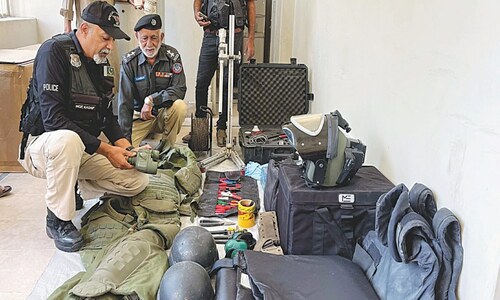KARACHI: Various experts at a workshop organised by the Shehri-Citizens for a Better Environment with support of the Friedrich Naumann Foundation examined the issues relating to ‘Transport Dilemma of Karachi’ at the Institute of Engineers Pakistan here on Saturday.
Giving a history of the city’s transport scene, architect and town planner Arif Hasan pointed out that there were some 37 motor cars in Karachi after Partition, which grew to 64 by 1954. But just one year later, in 1955, there were 157 cars here. Then as the number of cars grew space had to be made to accommodate them. The trams were removed from roads as they were seen as blocking traffic. It was said that the city would be given an underground metro system in place of the trams, which didn’t happen.
Discussing the Karachi resettlement plan and its effect on transport here, the government’s transport-related initiatives, the Karachi Transport Corporation that later went into loss for it to yet be decided that the public sector was incapable of operating it, the Karachi Circular Railway, various proposals, the CNG crisis and the Urban Transport Scheme and its failure, the expert said that many of the big buses brought here by the government through various schemes were either out of order or had been converted into goods-carrying trucks. “The private buses are much smaller, they are 35-seat minibuses that are seen as more feasible by their owners,” he said. And hence you see everyone travelling in cramped uncomfortable buses.
Mr Hasan also shared market responses of people to the buses where the commuters were too terrified of gas cylinders or being robbed off on bus and the women were especially uncomfortable with very little seating arrangement for them. He said that he was not a fan of motorcycles, but now after looking at how it had brought a change in people’s lives, he had to say that motorcycles were not too bad alternative to public transport. “It lessens travel costs, gives families freedom to move about, etc. But sadly most accidents here are also related to motorcycles,” he pointed out.
Urban transport expert Malik Zaheer, while speaking about the evolution of mass rapid transit with particular reference to the Bus Rapid Transit (BRT) system, said that other citizen-friendly places stressed more on non-motorised transport (NMTs) but here in Pakistan, especially Karachi, motorised transport (MTs) was stressed while going towards signal-free corridors for which roads were broadened as footpaths and walkways for pedestrians and bikers were forgotten.
“You say you will make Karachi like Paris, or make Karachi like London, but do you have the infrastructure for this?” He questioned.
Malik Zaheer called the BRT system not an infrastructure project but a public transport improvement programme, which could work well here. “With segregated bus ways, rapid boarding and alighting and clean and comfortable stations, the long train-like buses can carry up to 45,000 passengers per hour per direction,” he pointed out.
Architect and educationalist Prof Dr Noman Ahmed, speaking about the appraisal and way forward for transport and mobility issues, pointed out that from a small city, Karachi had grown into an urban region without boundaries. “Bahria Town and DHA City are tagged within Karachi despite being 50km away. Meanwhile our options of mobility are very primitive,” he said while discussing the Lyari Expressway, which is still only half functional, the Northern Bypass that was made to take cargo trucks straight to Superhighway, which didn’t really happen and the signal-free corridors for buses, which never arrived.
While agreeing with Malik Zaheer on the need for a BRT system in Karachi, Dr Noman also stressed that the sooner the Karachi Circular Railway was started here the better it would be. But he said that it was sad to see how plans here change with every new regime.
Published in Dawn, May 3rd, 2015
On a mobile phone? Get the Dawn Mobile App: Apple Store | Google Play















































Dear visitor, the comments section is undergoing an overhaul and will return soon.